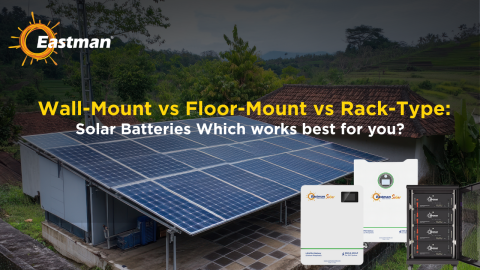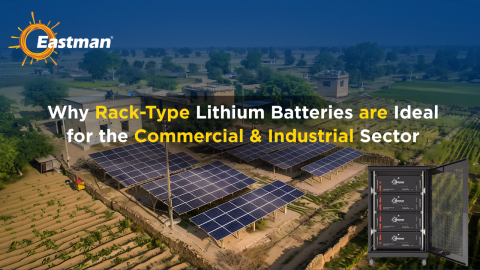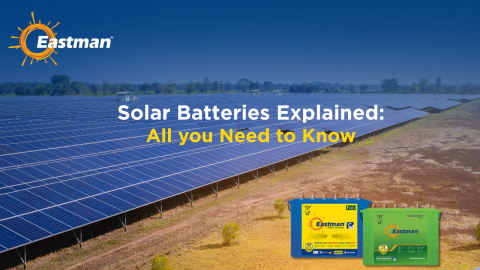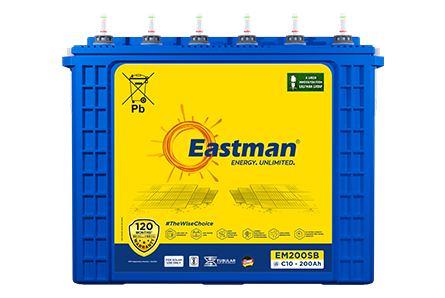



EM200SB
Capacity: 200Ah
Warranty: 120 Months (60+60)
Consumer Benefits
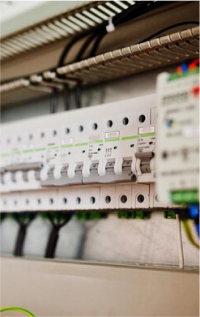
Maximum solar power generation even in low sunlight

Reduced electricity bills through efficient grid synchronization
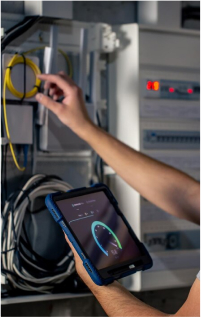
Safe operation with surge protection and IP65 design
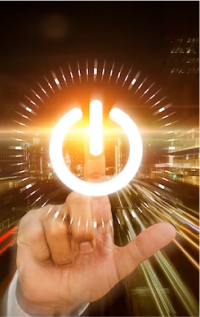
Easy installation and low maintenance

Net-metering friendly with zero-export control

Long product life backed by extended warranty
Features

Low Cost ofOwnership

Low WaterLoss

Easy RecoveryAfter Idle Period

Lowest ElectricityConsumption in Recharging

Less FumesGeneration

5% Extra Capacity & Backupw.r.t. Rated Capacity
Technical Specification
| S.No. | Parameters | EM200SB |
|---|---|---|
| 1 | Capacity | 200 Ah |
| 2 | Warranty | 60+60 Months |
| 3 | Gross Weight (in KG) | 66.0 |
| 4 | Battery Dimension (in mm) | 506*192*405 |
Applications
-

Homes with power backup requirement
-

Small offices & shop
-
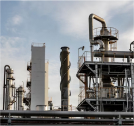
Institutions requiring continuous power
-

Solar systems with battery storage
FAQs
What is a Solar Battery?
A solar battery stores excess energy from solar panels for later use, typically during periods of low sunlight or at night.
Are solar batteries safe?
Yes, solar batteries are safe when installed and used properly, with built-in safety features to prevent overcharging, overheating, and short circuits.
What can damage solar battery?
Solar batteries can be damaged by overcharging, deep discharges, extreme temperatures, physical damage, and improper maintenance or installation.
Do solar batteries get hot?
Solar batteries may generate some heat during charging and discharging processes, but proper ventilation and cooling systems are usually in place to prevent overheating.
Do solar batteries go dead?
Solar batteries can lose their charge over time if not properly maintained or used, but they can be recharged using solar panels or other charging sources.
Can solar battery last all night?
Depending on the capacity & efficiency of the battery system and your power consumption, some solar batteries can provide enough stored energy to last through the night, especially when combined with energy-efficient appliances and systems.
Can solar batteries freeze?
Yes, solar batteries can freeze in extremely cold temperatures, potentially causing damage to the battery cells and reducing performance. Proper insulation and temperature control mechanisms can mitigate this risk.
Do solar batteries need ventilation?
Yes, proper ventilation is essential for solar batteries to dissipate heat generated during charging and discharging processes, ensuring optimal performance and longevity.
What reduces solar battery life?
Factors such as overcharging, deep discharges, high temperatures, poor ventilation, and lack of maintenance can reduce the lifespan of solar batteries.
Do solar batteries work in winter?
Yes, solar batteries can still function in winter, although their backup may be reduced due to fewer daylight hours and lower temperatures. Proper insulation and system design can help mitigate these effects.
What is the difference between normal battery and a solar battery?
Solar batteries are designed specifically for use with solar energy systems, featuring deep cycle capabilities and optimized for charging and discharging cycles compared to regular batteries.
c10 or c20? Which one is better
C10 is better and is setting the standard for superior performance!
How to maintain your Solar Battery?
Maintain your solar battery by ensuring regular inspections, keeping it clean, avoiding overcharging and deep discharges, monitoring DoD levels, maintaining proper ventilation, and following manufacturer guidelines for maintenance and storage.
Are Eastman Solar Batteries BIS certifed?
Yes, Eastman Solar Batteries are BIS (Bureau of Indian Standards) certified, ensuring compliance with safety and quality standards for solar energy storage solutions.
What is the warranty of Eastman Solar Batteries?
The warranty period for Eastman Solar Batteries typically ranges from 72 months to 120 months, depending on the specific model and terms provided by the manufacturer. Please refer to the warranty documentation for specific details.
Are Eastman Solar Batteries C10 rated?
Absolutely, Eastman Solar Batteries are C10 rated
What are the best features of Eastman Solar batteries?
The best features of Eastman Solar batteries include low cost of ownership, minimal water loss, easy recovery after idle periods, lower electricity consumption during recharging, and reduced fumes generation. Additionally, they offer an impressive 5% extra capacity and backup compared to their rated capacity, ensuring reliable and efficient power storage for solar applications.
What is the highest warranty of Eastman Solar batteries?
The highest warranty for Eastman Solar batteries is 120 months.


